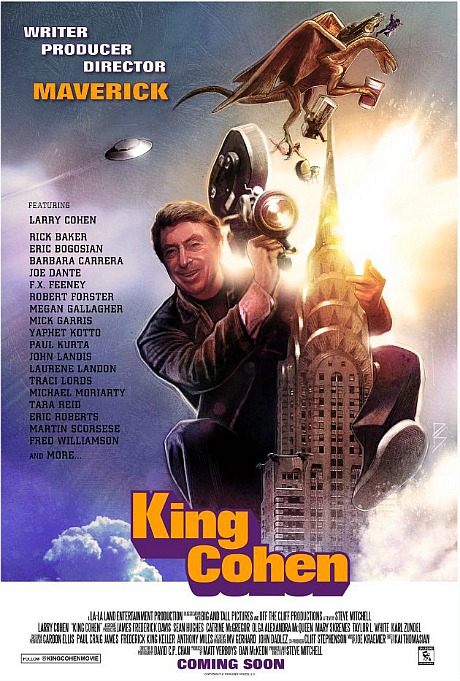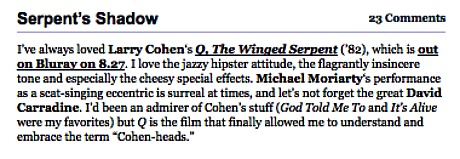HBO’s The Wizard of Lies, directed by Barry Levinson, pops on Saturday, 5.20 — right in the middle of the Cannes Film Festival. Robert De Niro as Bernie Madoff and Michelle Pfeiffer is wife Ruth, who of course knew everything. Based on the same-titled book, it costars Alessandro Nivola and Nathan Darrow as Madoff’s sons, Mark and Andrew plus Lily Rabe, Kristen Connolly and Hank Azaria.
Day: March 22, 2017
Eternal Fraternity of Cohen-Heads
I’ve been an admirer of director-writer Larry Cohen since the mid ’70s. I didn’t get him at first. My first impression was that he was making clever low-budget exploitation schlock, It’s Alive (’74) and God Told Me To (’76) being my first two samplings. I finally got him after seeing Q, The Winged Serpent (’82). I started to imagine that Cohen might be making dry exploitation film satires — that he might be half playing it straight for the sake of his investors but was also “in on the joke.” Or something like that. I’ve been running into Cohen and longtime pally Laurene Landon at Los Angeles parties and screenings for many years, and it’s good to see that Steve Mitchell‘s King Cohen is finally coming out. The talking heads include Martin Scorsese (who looks a good ten years younger in the trailer than he does today), John Landis, Michael Moriarty, Fred Williamson, Yaphet Kotto, Landon and several others.



Fanfare Meets Trepidation, Anxiety: Newman’s Five Came Back Theme
As noted in my Five Came Back review, Thomas Newman‘s main-title theme stands out like a sonuvabitch. It makes you think that John Ford, William Wyler, George Stevens, John Huston and Frank Capra were up to something more daring and dynamic than just shooting war footage, which of course they were. But the music announces this. It delivers an urgent, aggressive vibe along with a sense of “uh-oh, wait a minute…are we okay?”
Newman’s French horns or trombones or whatever aren’t Beethoven or Wagner-ish, but the notes aren’t as plain as they initially sound either. You could be hearing them in your head before a beach landing. Organized, aggressive, battalion-strength fanfare, but with the willies.
Newman’s theme is part of that tradition of swelling military music that includes Richard Rodgers‘ Victory at Sea and Jerry Goldsmith‘s main-title Patton theme, except Newman’s also includes an echo of John Williams‘ Olympics fanfare theme (and maybe even a dash of his Towering Inferno score).
Jeremy Turner (A Birder’s Guide to Everything, A Year in Space, Trophy) wrote all the Five Came Back music that isn’t heard in the opening and closing credits.
Again, the mp3.
“It’s Good To Be In The World…It’s Wonderful”
Trust the buzz: Laurent Bouzereau and Mark Harris‘ Five Came Back (Netflix, 3.31), a three-hour doc based on Harris’s 2014 book of the same title, is a knockout. Or at least it was for me. Call it an incisive, emotionally stirring, highly insightful saga of World War II, or rather the filming of it but in a broader sense the bruising reality of it. Like any good film Five Came Back swirls down, under, all around.
It focuses on five big-name Hollywood directors — John Ford, Frank Capra, William Wyler, George Stevens and John Huston — who put their Hollywood careers on hold during World War II in order to make propaganda-like documentaries (or doc-like propaganda films) for the U.S. War Department.
But it didn’t turn out that simply. While Capra devoted himself to producing several gung-ho esprit de corps films under the title of Why We Fight, Stevens, Ford, Wyler and Huston wound up capturing (and in a couple of instances recreating) harrowing scenes of real-life battle and carnage that not only shook them personally but led to periods of post-war melancholia as well as re-assessments of who they were and what kind of cinema they wanted to make. It also led to the making of their finest films, particularly in the case of Wyler (The Best Years of Our Lives), Capra (It’s A Wonderful Life) and Huston (Treasure of the Sierra Madre).

We’ve all have our impressions of World War II from this and that visual source (movies, docs, endless photos), but Millenials and perhaps even younger GenXers probably regard it as something that happened so long ago it’s in the same musty box as the Civil War. Five Came Back somehow makes this earth-shaking conflict seem more fierce and first-hand than it has since Saving Private Ryan (which is nearly 20 years old now, believe it or not).
This is largely, I feel, because of five present-day helmers — Steven Spielberg, Guillermo del Toro, Francis Coppola, Larry Kasdan and Paul Greengrass — passing along thoughts and musings about this great saga, each focusing on a specific director and storyline (Spielberg on Wyler, Kasdan on Stevens, Del Toro on Capra, Greengrass on Ford, Coppola on Huston). These guys sell the shit out of this thing, and you can only do that with conviction, intelligence and empathy.
All five of the WW II-era directors suffered wounds, bruises and traumas of one kind of another…nobody came out of it without some kind of limp.
Ford, who incurred the wrath of his military superiors after descending into a three-day alcoholic bender after witnessing the bloody D-Day slaughter (4000 Allied troops died on 6.6.44), became less of a Grapes of Wrath or Informer-styled social realist and increasingly devoted himself to Western myths, which could be seen as a kind of sentimental retreat.
Stevens, whose post-liberation footage of Dachau was used in Nuremberg war-crimes trials, wound up brooding for three or four years before finally getting back behind the camera to create his great American trilogy — A Place In The Sun (’51), Shane (’53) and Giant (’56) . He waited until the late ’50s to direct a WWII drama, The Diary of Anne Frank, that channeled or reflected his war experience.
Tugging At Sleeve, Rhetorical Self-Correction, A Certain Modesty, etc.
50something years ago we had a flawed but elegant, well-educated President who obscured the truth from time to time but at least respected basic concepts of truth and accuracy in government, politics and public affairs (i.e., decades before the loony right and “alternative facts”). Plus he dressed well and kept his weight in check. Now we have a grotesque beast sitting at the same desk, a Mussolini figure — a lying, delusional, foam-at-the-mouth animal who regards the Presidency not just as a solemn responsibility but a terrific financial opportunity for himself and his homies. Every day I sit here and seethe. Not in our stars but in ourselves. Thanks, bumblefucks.
Here We Go Again
Yet another Islamic Jihadist wackjob attack, this time in London with a Nice-styled mowdown of several pedestrians by a large vehicle (at least one woman killed), followed by a stabbing of a police officer and then the assailant shot to death. We don’t know actually know that it was an ISIS-supporting, Allah-worshipping nutter. It could have been a college-educated Swede or Dane. The perpetrator might have been an exchange student from Georgia or Oregon. But if you were Sam Harris or Bill Maher, what would you be muttering right now? What did you mutter to yourself the moment you heard the news?…be honest. Thousands upon thousands of American tourists have just cancelled plans to visit London this summer because the actions of one or two lone-wolf assholes means that London is now a more dangerous city than it was before today’s incident.
